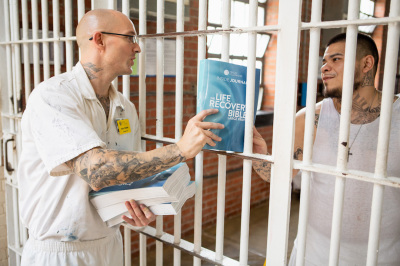There's no Plan B: God’s plan for reaching prisoners

The sheer number of people impacted by incarceration is staggering: Approximately 1.8 million men and women in America are incarcerated — and approximately 1.5 million children have an incarcerated parent. That population isn’t just dramatically larger than most of us realize; it’s also much closer to our own communities and families than we perceive.
The odds are good that a family impacted by incarceration is part of our neighborhood, church, or workplace. And it’s our responsibility and privilege to love them like Christ does.
Yet recent data from the annual State of the Bible report found that only 40% of American Christians who actively and regularly engage with Scripture either agree or strongly agree that they value caring for incarcerated individuals.
Christ explicitly calls His followers to care for those in prison. With so many Americans impacted by incarceration — and just 23% of the general American population sharing the belief that incarcerated men and women need and deserve our care — it’s more important than ever that the Church embrace its role as the hands and feet of Jesus.
Discomfort is always part of Christian love. In Hebrews 13:1-3, God calls us to an expansive and uncomfortable kind of love, one that includes those in prison. And this form of ministry is no exception.
“Keep on loving one another as brothers and sisters,” we read in Hebrews. “Do not forget to show hospitality to strangers, for by so doing some people have shown hospitality to angels without knowing it. Continue to remember those in prison as if you were together with them in prison, and those who are mistreated as if you yourselves were suffering.”
Each of these exhortations builds off the last: Love your brothers. Love strangers. Remember the imprisoned and the mistreated. Loving our inner circle is easiest. But we’re invited to go further — to the stranger and to those behind bars.
We are called by God to love the guilty as well as the innocent. We are called to follow Jesus outside of our comfort zone, to follow Him toward those He loves. And the reward for doing so is nothing less than the joy of participating in God’s loving work here in our own communities.
The language here is important. “Remembering” in the Bible — and particularly in Hebrews 13 — isn’t just recollection. It’s beholding something. A call to “remember” the imprisoned is a call to look, to behold, to make them real to your senses.
In saying “remember those in prison,” the writer of Hebrews is asking us to behold the sacredness that exists in those who are forgotten. We are invited to participate in God’s work, to share in something He is already building, when we join any effort to minister to the incarcerated. We’re coming alongside the work of God’s grace.
In other words, we encounter Jesus with those in prison. Our life in Jesus is expanded and enriched, sometimes altered forever, by these encounters.
God wants us to see the transformative work He is doing and to participate in it. He invites each of us to share in His plan for His sons and daughters. We each have a chance to witness tremendous grace and love in prison ministry — and fulfill a clear scriptural directive.
Of course, life is busy. It’s easy to forget those in prison largely because we cannot see them. But as Christians, we must strive never to let ourselves become indifferent. We must not let the world distract us from the privilege and joy of doing the work of the Kingdom, especially for those who are so often forgotten.
Prison is a place of forsakenness. Incarcerated men and women are blotted out from people's consciousness, but they shouldn’t be. It’s a tragedy that 60% of Americans who regularly and intentionally engage with Scripture don’t hold incarcerated men and women in their hearts.
It’s also an avoidable tragedy. Programs like Prison Fellowship Angel Tree are an easy and accessible path for those interested in participating in prison ministry, especially since it operates in all 50 states, supporting the families of those in prison.
With programs like Angel Tree, you don’t even have to visit a prison. You just have to be willing to embrace a new family in your community. Prison ministry in all its forms is a tremendous spiritual blessing, a work of mercy, and a powerful way to steward the community God has given you.
So, take the next step into God’s plan for you. Remember the imprisoned. Embrace and support them — and their families — with the love and care God made us to give.
After all, in the Bible, God’s plan for the restoration of the world is the Church. We are the Church, and there is no Plan B.
Cody Wilde is the senior vice president of correctional programs at Prison Fellowship.




























